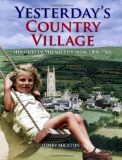-
History of:
- Resources about:
- More:
- Baby walkers
- Bakehouses
- Bed warmers
- Beer, ale mullers
- Besoms, broom-making
- Box, cabinet, and press beds
- Butter crocks, coolers
- Candle snuffers, tallow
- Clothes horses, airers
- Cooking on a peat fire
- Drying grounds
- Enamel cookware
- Fireplaces
- Irons for frills & ruffles
- Knitting sheaths, belts
- Laundry starch
- Log cabin beds
- Lye and chamber-lye
- Mangles
- Marseilles quilts
- Medieval beds
- Rag rugs
- Rushlights, dips & nips
- Straw mattresses
- Sugar cutters - nips & tongs
- Tablecloths
- Tinderboxes
- Washing bats and beetles
- Washing dollies
- List of all articles
Subscribe to RSS feed or get email updates.

Yesterday's Country Village: Memories of Village Life from 1900-1960by Henry Buckton
London, south-east England, home counties
Ideas for visits to old cottages, farmhouses, poor and middling homes - exploring rural life, domestic life in town and village, as lived in the past - living history experiences.
This is a guide for people who want to visit museums of "folk life" or ordinary homes from previous centuries. You can explore social history in villages, settlements, open air museums, or farm and urban heritage exhibits telling the story of working people's daily lives in town or country. We list places where you can look at domestic life, everyday objects, traditional crafts, old cottages, preserved villages, old-fashioned farms etc. from past centuries. OldandInteresting hopes these suggestions will help people find good days out, and plan holidays. Enjoy!
The Weald and Downland museum is a wonderful and ambitious project with historic buildings saved from developers in the densely-populated south-east. A variety have been painstakingly rebuilt on site, set in context, with authentic furnishings. As well as the interesting rural life and folk museums within easy reach of the big city, there are more "formal" museums in London with an emphasis on everyday home life. The Geffrye Museum's interiors are middle-class, not from the poorest homes (though the almshouse rooms are simply furnished), and this means they are full of interesting domestic items covering several centuries.
- Also, see pages for:
- Scotland
- Northern England
- Wales
- Midlands
- South-West England
- East Anglia
London, adjacent counties, and south coast
Berkshire
Buckinghamshire
Essex
Greater London
- Geffrye Museum
- Museum of London
- MoDA with 2 galleries telling
- "the story of ordinary homes" in the 20th C
Hampshire
Hertfordshire
- 1940s House, Bushey
- Verulamium - Romano-British cottage kitchen
Kent
Surrey
- Rural Life Centre - Farnham
- Oakhurst Cottage
- Hampton Cottage - Leatherhead Museum
Sussex
Please check opening times - especially of smaller or volunteer-run places.
Please send an email if you want to suggest an addition to this list of museums and other exhibits about "ordinary" or "folk" or "everyday" ways of life in the past. So far we're trying to cover Britain and then Ireland, but suggestions for a future USA list are also very welcome. Even though grand castles and stately homes are fascinating too, sometimes with interesting kitchens, laundry rooms etc., they aren't listed here, and nor are industrial heritage exhibits all about manufacturing and technology, without workers' cottages. These pages emphasise ordinary domestic life, our ancestors' everyday objects, traditional crafts, living history, old cottages, preserved villages, old-fashioned farms etc.
Copyright - Information is free, but lists are not! This is the legal position in the UK, and in the USA and many other countries too for "creative" lists like this. As you will appreciate, it takes time, effort, and knowledge to assemble this kind of directory. OldandInteresting has reserved all rights in this work. If you think your readers would be interested, please just link and don't copy.
You may like our new sister site Home Things Past where you'll find articles about antiques, vintage kitchen stuff, crafts, and other things to do with home life in the past. There's space for comments and discussion too. Please do take a look and add your thoughts. (Comments don't appear instantly.)
For sources please refer to the books page, and/or the excerpts quoted on the pages of this website, and note that many links lead to museum sites. Feel free to ask if you're looking for a specific reference - feedback is always welcome anyway. Unfortunately, it's not possible to help you with queries about prices or valuation.


